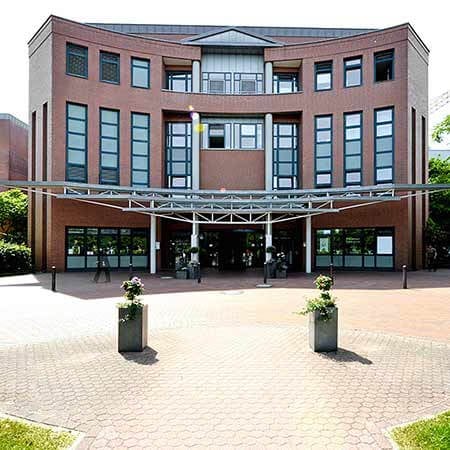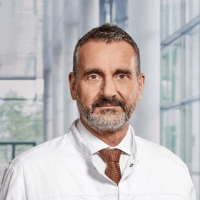Mitral Valve Stenosis — Mitral Valve Replacement: treatment in the Best Hospitals in the World
Treatment prices are regulated by national law of the corresponding countries, but can also include additional hospital coefficients. In order to receive the individual cost calculation, please send us the request and medical records.

Department of Cardiothoracic Surgery
According to the Focus magazine, the Department of Cardiothoracic Surgery ranks among the top German medical facilities specializing in the surgical treatment of diseases of the cardiovascular system and lung cancer! The department offers the full range of surgical services for the treatment of diseases of the cardiovascular system, respiratory tract, including heart and lung transplantation, artificial heart implantation. The therapeutic options include aortic surgery, coronary artery bypass grafting, transplantation surgery, surgical treatment of heart rhythm disorders (arrhythmias), minimally invasive surgery, surgical treatment of the heart valves, including reconstructive interventions. All operations are performed using state-of-the-art technology and in accordance with the current recommendations of professional societies.






Department of Cardiac Surgery
The Department of Cardiac Surgery provides a full range of surgical treatment in its area of specialization. Special emphasis is placed on heart valve repair and replacement surgery, coronary artery bypass grafting, thoracic aortic surgery, adult congenital and acquired heart disease surgery, pacemaker and defibrillator implantation, and artificial heart implantation for severe heart failure. Many heart operations are performed using minimally invasive techniques, which has a positive effect on the healing of the surgical wound. Minimally invasive cardiac procedures also reduce surgical risks and contribute to a rapid recovery of the patient in the postoperative period. Surgical treatment of cardiac pathologies is performed in advanced operating rooms equipped with the latest technology. The cardiac surgeons of the department successfully perform routine and complex surgical procedures, saving the lives of thousands of patients. The specialists work in accordance with current clinical protocols and follow the recommendations of the German Society for Thoracic and Cardiovascular Surgery (DGTHG).


Department of Cardiothoracic Surgery and Vascular Surgery
The Department of Cardiothoracic Surgery and Vascular Surgery provides effective surgical treatment for diseases of the heart, respiratory system, and blood vessels. The team of cardiac surgeons operates on patients with heart valve pathologies, coronary heart disease, heart failure, and heart rhythm disturbances. In the field of thoracic surgery, the key focus is on the surgical removal of lung tumors and lung metastases. The specialists in this area also perform surgery to repair chest wall deformities. In the field of vascular surgery, interventions for abdominal and thoracic aortic aneurysms are most often performed here. The department's vascular surgeons are also exceptionally competent in the treatment of peripheral occlusive arterial disease. A great advantage for the department's patients is that almost all surgical interventions are performed using minimally invasive techniques, so there is no need for a long postoperative recovery. The department's operating rooms are equipped with state-of-the-art technology. This allows for effective and safe treatment. The priority is always personalized medical care for patients.






Mitral valve replacement surgery is a complex and unsafe operation that is best performed at reputable clinics to obtain reliable results and avoid the development of complications. The Booking Health website presents the best cardiosurgery departments abroad where you can seek medical attention.
Content
- Who may require mitral valve replacement surgery?
- How is mitral valve replacement surgery performed?
- Is minimally invasive mitral valve replacement possible?
As a rule, this is open-heart surgery. Doctors implant an artificial mitral valve instead of the patient's own. Less commonly, an artificial biological heart valve can be implanted using an endovascular technique (through the blood vessels). This is possible in high-risk surgical patients or for revision heart valve replacement surgery.
You can seek medical attention from the University Hospital Essen, the University Hospital Ulm, or the University Hospital Oldenburg.
The specialists from the Booking Health company will take care of all the arrangements for your trip abroad. We will contact the hospital administration and make your appointment on your preferred dates. We will also book hotel and airline tickets for you, help you prepare documents, meet you at the airport of another country, and take you to the hospital by car.
Who may require mitral valve replacement surgery?
Mitral valve replacement surgery is a relatively uncommon treatment option as it is not the main treatment method. This is due to the fact that cardiosurgery doctors prefer mitral valve repair if possible. In this case, the best hemodynamic parameters are achieved, and patients do not need any revision surgical procedures in the future. Furthermore, long-term or lifelong anticoagulant use is not required.
Indications for mitral valve replacement surgery are the following:
- rheumatic malformations, which often lead to severe heart valve destruction;
- subvalvular aortic stenosis;
- significant leaflet calcification when a commissurotomy for mitral valve stenosis treatment will not significantly increase its area;
- combination of mitral valve insufficiency and stenosis.
How is mitral valve replacement surgery performed?
Mitral valve replacement is typically performed as open-heart surgery with a heart-lung machine. Doctors implant an artificial prosthesis instead of the patient's own mitral valve.
The prosthesis can be biological or mechanical. Each option has its own advantages and disadvantages. Biological prostheses are most often implanted in elderly patients because they provide better hemodynamics and do not require a lifelong intake of anticoagulants. Mechanical artificial heart valves, however, serve indefinitely, while biological ones degrade after 10-15 years, so they are preferred to be implanted in young patients.
Is minimally invasive mitral valve replacement possible?
Such operations exist but are uncommon. The possibility of implanting an artificial heart valve through the blood vessels may be considered by doctors in a patient with a high surgical risk who is contraindicated for open surgery.
Doctors rarely perform endovascular heart valve implantation in patients who have not previously been treated with surgery. The prosthesis is more often implanted using endovascular techniques in place of a previously implanted and worn biological prosthesis, as well as inside the support ring after an annuloplasty (mitral valve repair). It is a sparing, minimally invasive procedure that reduces recovery time for patients.
You are welcome to use the Booking Health service to undergo your treatment abroad. We will select hospitals with cardiosurgery departments for you whose doctors achieve high success rates in the treatment of valvular heart disease. On our website, you can find out the surgical treatment cost and make an appointment at a hospital at a favorable price.
Authors:
The article was edited by medical experts, board-certified doctors Dr. Nadezhda Ivanisova and Dr. Vadim Zhiliuk. For the treatment of the conditions referred to in the article, you must consult a doctor; the information in the article is not intended for self-medication!
Sources:

